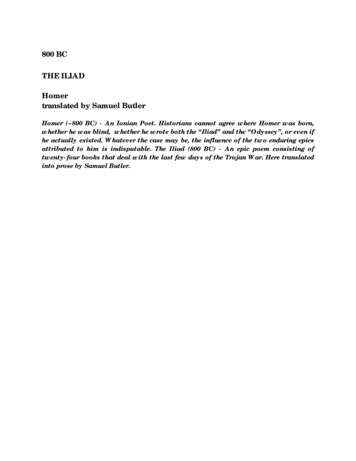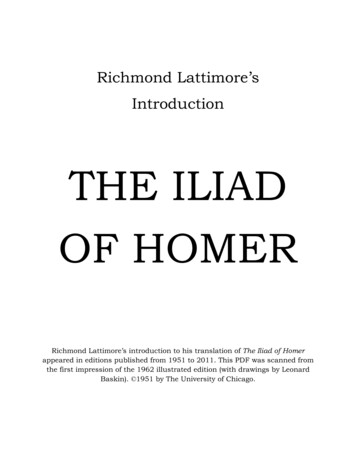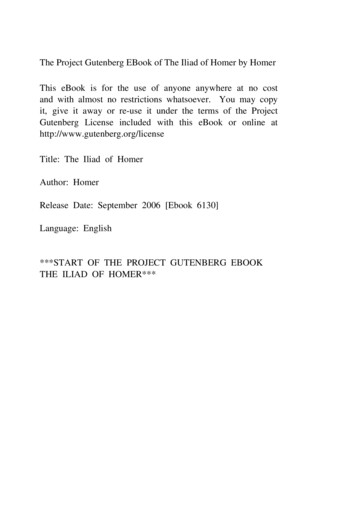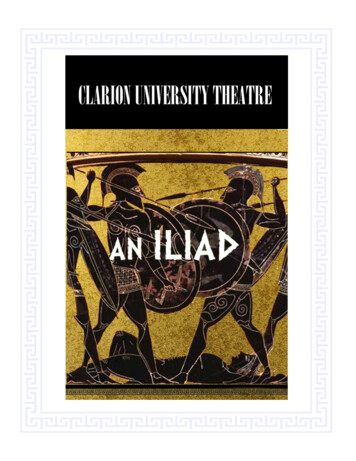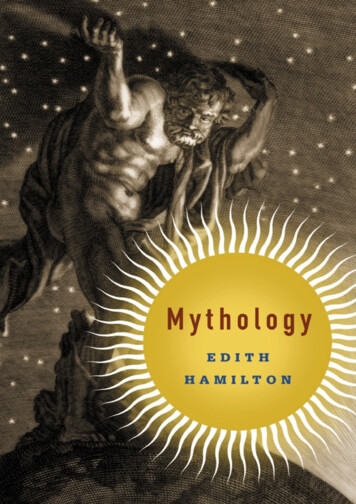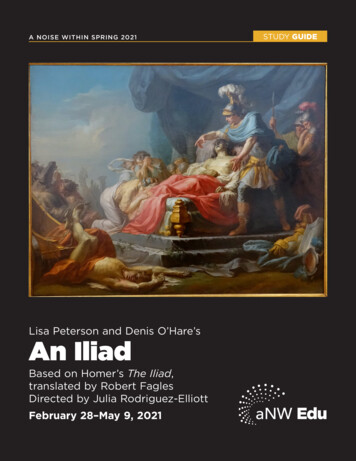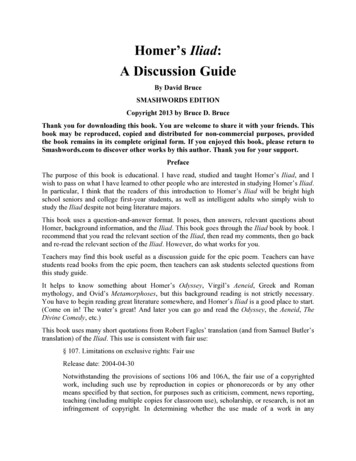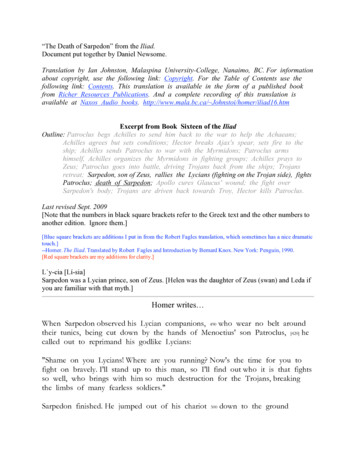
Transcription
www.freeclassicebooks.comThe Iliad Of HomerByHomerwww.freeclassicebooks.com1
www.freeclassicebooks.comContentsINTRODUCTION. 4POPE'S PREFACE TO THE ILIAD OF HOMER. 27THE ILIAD.45BOOK I. .45ARGUMENT.(40) ‐ THE CONTENTION OF ACHILLES AND AGAMEMNON. .45BOOK II. .59ARGUMENT ‐ THE TRIAL OF THE ARMY, AND CATALOGUE OF THE FORCES. .59ARGUMENT ‐ THE DUEL OF MENELAUS AND PARIS. .78BOOK IV.89ARGUMENT ‐THE BREACH OF THE TRUCE, AND THE FIRST BATTLE. .89BOOK V.101ARGUMENT ‐ THE ACTS OF DIOMED. .101BOOK VI.121ARGUMENT ‐ THE EPISODES OF GLAUCUS AND DIOMED, AND OF HECTOR AND ANDROMACHE.121BOOK VII.133ARGUMENT ‐ THE SINGLE COMBAT OF HECTOR AND AJAX. .133BOOK VIII.144ARGUMENT ‐ THE SECOND BATTLE, AND THE DISTRESS OF THE GREEKS.144BOOK IX. .157BOOK X. .171ARGUMENT ‐ THE NIGHT‐ADVENTURE OF DIOMED AND ULYSSES. .171BOOK XI. .184ARGUMENT ‐ THE THIRD BATTLE, AND THE ACTS OF AGAMEMNON. .184BOOK XII. .2012
www.freeclassicebooks.comARGUMENT ‐ THE BATTLE AT THE GRECIAN WALL.201ARGUMENT ‐THE FOURTH BATTLE CONTINUED, IN WHICH NEPTUNE ASSISTS THE GREEKS: THE ACTSOF IDOMENEUS.211ARGUMENT.(231) ‐ JUNO DECEIVES JUPITER BY THE GIRDLE OF VENUS.229BOOK XV.241ARGUMENT ‐ THE FIFTH BATTLE AT THE SHIPS; AND THE ACTS OF AJAX. .241BOOK XVI.257ARGUMENT ‐ THE SIXTH BATTLE, THE ACTS AND DEATH OF PATROCLUS .257BOOK XVII.276ARGUMENT ‐ THE SEVENTH BATTLE, FOR THE BODY OF PATROCLUS.‐‐THE ACTS OF MENELAUS. .276ARGUMENT ‐ THE GRIEF OF ACHILLES, AND NEW ARMOUR MADE HIM BY VULCAN. .292BOOK XIX.305ARGUMENT ‐ THE RECONCILIATION OF ACHILLES AND AGAMEMNON. .305BOOK XX.314ARGUMENT ‐ THE BATTLE OF THE GODS, AND THE ACTS OF ACHILLES.314BOOK XXI.324ARGUMENT ‐ THE BATTLE IN THE RIVER SCAMANDER.(269) .324BOOK XXII.337ARGUMENT ‐ THE DEATH OF HECTOR. .337BOOK XXIII.349ARGUMENT ‐ FUNERAL GAMES IN HONOUR OF PATROCLUS.(280).349BOOK XXIV.367ARGUMENT ‐ THE REDEMPTION OF THE BODY OF HECTOR. .3673
www.freeclassicebooks.comINTRODUCTION.Scepticism is as much the result of knowledge, as knowledge is ofscepticism. To be content with what we at present know, is, for the mostpart, to shut our ears against conviction; since, from the very gradualcharacter of our education, we must continually forget, and emancipateourselves from, knowledge previously acquired; we must set aside oldnotions and embrace fresh ones; and, as we learn, we must be dailyunlearning something which it has cost us no small labour and anxiety toacquire.And this difficulty attaches itself more closely to an age in which progresshas gained a strong ascendency over prejudice, and in which persons andthings are, day by day, finding their real level, in lieu of their conventionalvalue. The same principles which have swept away traditional abuses, andwhich are making rapid havoc among the revenues of sinecurists, andstripping the thin, tawdry veil from attractive superstitions, are working asactively in literature as in society. The credulity of one writer, or thepartiality of another, finds as powerful a touchstone and as wholesome achastisement in the healthy scepticism of a temperate class of antagonists,as the dreams of conservatism, or the impostures of pluralist sinecures inthe Church. History and tradition, whether of ancient or comparativelyrecent times, are subjected to very different handling from that which theindulgence or credulity of former ages could allow. Mere statements arejealously watched, and the motives of the writer form as important aningredient in the analysis of his history, as the facts he records. Probabilityis a powerful and troublesome test; and it is by this troublesome standardthat a large portion of historical evidence is sifted. Consistency is no lesspertinacious and exacting in its demands. In brief, to write a history, wemust know more than mere facts. Human nature, viewed under aninduction of extended experience, is the best help to the criticism of humanhistory. Historical characters can only be estimated by the standard whichhuman experience, whether actual or traditionary, has furnished. To formcorrect views of individuals we must regard them as forming parts of a greatwhole--we must measure them by their relation to the mass of beings bywhom they are surrounded, and, in contemplating the incidents in theirlives or condition which tradition has handed down to us, we must ratherconsider the general bearing of the whole narrative, than the respectiveprobability of its details.It is unfortunate for us, that, of some of the greatest men, we know least,4
www.freeclassicebooks.comand talk most. Homer, Socrates, and Shakespere(1) have, perhaps,contributed more to the intellectual enlightenment of mankind than anyother three writers who could be named, and yet the history of all three hasgiven rise to a boundless ocean of discussion, which has left us little savethe option of choosing which theory or theories we will follow. Thepersonality of Shakespere is, perhaps, the only thing in which critics willallow us to believe without controversy; but upon everything else, even downto the authorship of plays, there is more or less of doubt and uncertainty. OfSocrates we know as little as the contradictions of Plato and Xenophon willallow us to know. He was one of the dramatis personae in two dramas asunlike in principles as in style. He appears as the enunciator of opinions asdifferent in their tone as those of the writers who have handed them down.When we have read Plato or Xenophon, we think we know something ofSocrates; when we have fairly read and examined both, we feel convincedthat we are something worse than ignorant.It has been an easy, and a popular expedient, of late years, to deny thepersonal or real existence of men and things whose life and condition weretoo much for our belief. This system--which has often comforted thereligious sceptic, and substituted the consolations of Strauss for those of theNew Testament--has been of incalculable value to the historical theorists ofthe last and present centuries. To question the existence of Alexander theGreat, would be a more excusable act, than to believe in that of Romulus. Todeny a fact related in Herodotus, because it is inconsistent with a theorydeveloped from an Assyrian inscription which no two scholars read in thesame way, is more pardonable, than to believe in the good-natured old kingwhom the elegant pen of Florian has idealized--Numa Pompilius.Scepticism has attained its culminating point with respect to Homer, andthe state of our Homeric knowledge may be described as a free permission tobelieve any theory, provided we throw overboard all written tradition,concerning the author or authors of the Iliad and Odyssey. What fewauthorities exist on the subject, are summarily dismissed, although thearguments appear to run in a circle. "This cannot be true, because it is nottrue; and, that is not true, because it cannot be true." Such seems to be thestyle, in which testimony upon testimony, statement upon statement, isconsigned to denial and oblivion.It is, however, unfortunate that the professed biographies of Homer arepartly forgeries, partly freaks of ingenuity and imagination, in which truth isthe requisite most wanting. Before taking a brief review of the Homerictheory in its present conditions, some notice must be taken of the treatiseon the Life of Homer which has been attributed to Herodotus.5
www.freeclassicebooks.comAccording to this document, the city of Cumae in Æolia, was, at an earlyperiod, the seat of frequent immigrations from various parts of Greece.Among the immigrants was Menapolus, the son of Ithagenes. Although poor,he married, and the result of the union was a girl named Critheis. The girlwas left an orphan at an early age, under the guardianship of Cleanax, ofArgos. It is to the indiscretion of this maiden that we "are indebted for somuch happiness." Homer was the first fruit of her juvenile frailty, andreceived the name of Melesigenes, from having been born near the riverMeles, in Boeotia, whither Critheis had been transported in order to save herreputation."At this time," continues our narrative, "there lived at Smyrna a man namedPhemius, a teacher of literature and music, who, not being married, engagedCritheis to manage his household, and spin the flax he received as the priceof his scholastic labours. So satisfactory was her performance of this task,and so modest her conduct, that he made proposals of marriage, declaringhimself, as a further inducement, willing to adopt her son, who, he asserted,would become a clever man, if he were carefully brought up."They were married; careful cultivation ripened the talents which nature hadbestowed, and Melesigenes soon surpassed his schoolfellows in everyattainment, and, when older, rivalled his preceptor in wisdom. Phemiusdied, leaving him sole heir to his property, and his mother soon followed.Melesigenes carried on his adopted father's school with great success,exciting the admiration not only of the inhabitants of Smyrna, but also ofthe strangers whom the trade carried on there, especially in the exportationof corn, attracted to that city. Among these visitors, one Mentes, fromLeucadia, the modern Santa Maura, who evinced a knowledge andintelligence rarely found in those times, persuaded Melesigenes to close hisschool, and accompany him on his travels. He promised not only to pay hisexpenses, but to furnish him with a further stipend, urging, that, "While hewas yet young, it was fitting that he should see with his own eyes thecountries and cities which might hereafter be the subjects of hisdiscourses." Melesigenes consented, and set out with his patron, "examiningall the curiosities of the countries they visited, and informing himself ofeverything by interrogating those whom he met." We may also suppose, thathe wrote memoirs of all that he deemed worthy of preservation(2) Having setsail from Tyrrhenia and Iberia, they reached Ithaca. Here Melesigenes, whohad already suffered in his eyes, became much worse, and Mentes, who wasabout to leave for Leucadia, left him to the medical superintendence of afriend of his, named Mentor, the son of Alcinor. Under his hospitable andintelligent host, Melesigenes rapidly became acquainted with the legends6
www.freeclassicebooks.comrespecting Ulysses, which afterwards formed the subject of the Odyssey. Theinhabitants of Ithaca assert, that it was here that Melesigenes became blind,but the Colophomans make their city the seat of that misfortune. He thenreturned to Smyrna, where he applied himself to the study of poetry.(3)But poverty soon drove him to Cumae. Having passed over the Hermaeanplain, he arrived at Neon Teichos, the New Wall, a colony of Cumae. Here hismisfortunes and poetical talent gained him the friendship of one Tychias, anarmourer. "And up to my time," continued the author, "the inhabitantsshowed the place where he used to sit when giving a recitation of his verses,and they greatly honoured the spot. Here also a poplar grew, which theysaid had sprung up ever since Melesigenes arrived".(4)But poverty still drove him on, and he went by way of Larissa, as being themost convenient road. Here, the Cumans say, he composed an epitaph onGordius, king of Phrygia, which has however, and with greater probability,been attributed to Cleobulus of Lindus.(5)Arrived at Cumae, he frequented the converzationes(6) of the old men, anddelighted all by the charms of his poetry. Encouraged by this favourablereception, he declared that, if they would allow him a public maintenance,he would render their city most gloriously renowned. They avowed theirwillingness to support him in the measure he proposed, and procured himan audience in the council. Having made the speech, with the purport ofwhich our author has forgotten to acquaint us, he retired, and left them todebate respecting the answer to be given to his proposal.The greater part of the assembly seemed favourable to the poet's demand,but one man observed that "if they were to feed Homers, they would beencumbered with a multitude of useless people." "From this circumstance,"says the writer, "Melesigenes acquired the name of Homer, for the Cumanscall blind men Homers."(7) With a love of economy, which shows how similarthe world has always been in its treatment of literary men, the pension wasdenied, and the poet vented his disappointment in a wish that Cumoeamight never produce a poet capable of giving it renown and glory.At Phocoea, Homer was destined to experience another literary distress. OneThestorides, who aimed at the reputation of poetical genius, kept Homer inhis own house, and allowed him a pittance, on condition of the verses of thepoet passing in his name. Having collected sufficient poetry to be profitable,Thestorides, like some would-be-literary publishers, neglected the manwhose brains he had sucked, and left him. At his departure, Homer is saidto have observed: "O Thestorides, of the many things hidden from the7
www.freeclassicebooks.comknowledge of man, nothing is more unintelligible than the human heart."(8)Homer continued his career of difficulty and distress, until some Chianmerchants, struck by the similarity of the verses they heard him recite,acquainted him with the fact that Thestorides was pursuing a profitablelivelihood by the recital of the very same poems. This at once determinedhim to set out for Chios. No vessel happened then to be setting sail thither,but he found one ready to Start for Erythrae, a town of Ionia, which facesthat island, and he prevailed upon the seamen to allow him to accompanythem. Having embarked, he invoked a favourable wind, and prayed that hemight be able to expose the imposture of Thestorides, who, by his breach ofhospitality, had drawn down the wrath of Jove the Hospitable.At Erythrae, Homer fortunately met with a person who had known him inPhocoea, by whose assistance he at length, after some difficulty, reached thelittle hamlet of Pithys. Here he met with an adventure, which we willcontinue in the words of our author. "Having set out from Pithys, Homerwent on, attracted by the cries of some goats that were pasturing. The dogsbarked on his approach, and he cried out. Glaucus (for that was the name ofthe goat-herd) heard his voice, ran up quickly, called off his dogs, and drovethem away from Homer. For or some time he stood wondering how a blindman should have reached such a place alone, and what could be his designin coming. He then went up to him, and inquired who he was, and how hehad come to desolate places and untrodden spots, and of what he stood inneed. Homer, by recounting to him the whole history of his misfortunes,moved him with compassion; and he took him, and led him to his cot, andhaving lit a fire, bade him sup.(9)"The dogs, instead of eating, kept barking at the stranger, according to theirusual habit. Whereupon Homer addressed Glaucus thus: O Glaucus, myfriend, prythee attend to my behest. First give the dogs their supper at thedoors of the hut: for so it is better, since, whilst they watch, nor thief norwild beast will approach the fold.Glaucus was pleased with the advice, and marvelled at its author. Havingfinished supper, they banqueted(10) afresh on conversation, Homernarrating his wanderings, and telling of the cities he had visited.At length they retired to rest; but on the following morning, Glaucusresolved to go to his master, and acquaint him with his meeting with Homer.Having left the goats in charge of a fellow-servant, he left Homer at home,promising to return quickly. Having arrived at Bolissus, a place near thefarm, and finding his mate, he told him the whole story respecting Homer8
www.freeclassicebooks.comand his journey. He paid little attention to what he said, and blamedGlaucus for his stupidity in taking in and feeding maimed and enfeebledpersons. However, he bade him bring the stranger to him.Glaucus told Homer what had taken place, and bade him follow him,assuring him that good fortune would be the result. Conversation soonshowed that the stranger was a man of much cleverness and generalknowledge, and the Chian persuaded him to remain, and to undertake thecharge of his children.(11)Besides the satisfaction of driving the impostor Thestorides from the island,Homer enjoyed considerable success as a teacher. In the town of Chios heestablished a school where he taught the precepts of poetry. "To this day,"says Chandler,(12) "the most curious remain is that which has been named,without reason, the School of Homer. It is on the coast, at some distancefrom the city, northward, and appears to have been an open temple ofCybele, formed on the top of a rock. The shape is oval, and in the centre isthe image of the goddess, the head and an arm wanting. She is represented,as usual, sitting. The chair has a lion carved on each side, and on the back.The area is bounded by a low rim, or seat, and about five yards over. Thewhole is hewn out of the mountain, is rude, indistinct, and probably of themost remote antiquity."So successful was this school, that Homer realised a considerable fortune.He married, and had two daughters, one of whom died single, the othermarried a Chian.The following passage betrays the same tendency to connect the personagesof the poems with the history of the poet, which has already beenmentioned:-"In his poetical compositions Homer displays great gratitude towards Mentorof Ithaca, in the Odyssey, whose name he has inserted in his poem as thecompanion of Ulysses,(13) in return for the care taken of him when afflictedwith blindness. He also testifies his gratitude to Phemius, who had givenhim both sustenance and instruction."His celebrity continued to increase, and many persons advised him to visitGreece, whither his reputation had now extended. Having, it is said, madesome additions to his poems calculated to please the vanity of theAthenians, of whose city he had hitherto made no mention,(14) he sent outfor Samos. Here being recognized by a Samian, who had met with him inChios, he was handsomely received, and invited to join in celebrating the9
www.freeclassicebooks.comApaturian festival. He recited some verses, which gave great satisfaction,and by singing the Eiresione at the New Moon festivals, he earned asubsistence, visiting the houses of the rich, with whose children he was verypopular.In the spring he sailed for Athens, and arrived at the island of Ios, now Ino,where he fell extremely ill, and died. It is said that his death arose fromvexation, at not having been able to unravel an enigma proposed by somefishermen's children.(15)Such is, in brief, the substance of the earliest life of Homer we possess, andso broad are the evidences of its historical worthlessness, that it is scarcelynecessary to point them out in detail. Let us now consider some of theopinions to which a persevering, patient, and learned--but by no meansconsistent--series of investigations has led. In doing so, I profess to bringforward statements, not to vouch for their reasonableness or probability."Homer appeared. The history of this poet and his works is lost in doubtfulobscurity, as is the history of many of the first minds who have done honourto humanity, because they rose amidst darkness. The majestic stream of hissong, blessing and fertilizing, flows like the Nile, through many lands andnations; and, like the sources of the Nile, its fountains will ever remainconcealed."Such are the words in which one of the most judicious German critics haseloquently described the uncertainty in which the whole of the Homericquestion is involved. With no less truth and feeling he proceeds:-"It seems here of chief importance to expect no more than the nature ofthings makes possible. If the period of tradition in history is the region oftwilight, we should not expect in it perfect light. The creations of geniusalways seem like miracles, because they are, for the most part, created farout of the reach of observation. If we were in possession of all the historicaltestimonies, we never could wholly explain the origin of the Iliad and theOdyssey; for their origin, in all essential points, must have remained thesecret of the poet." (16)From this criticism, which shows as much insight into the depths of humannature as into the minute wire-drawings of scholastic investigation, let uspass on to the main question at issue. Was Homer an individual?(17) orwere the Iliad and Odyssey the result of an ingenious arrangement offragments by earlier poets?10
www.freeclassicebooks.comWell has Landor remarked: "Some tell us there were twenty Homers; somedeny that there was ever one. It were idle and foolish to shake the contentsof a vase, in order to let them settle at last. We are perpetually labouring todestroy our delights, our composure, our devotion to superior power. Of allthe animals on earth we least know what is good for us. My opinion is, thatwhat is best for us is our admiration of good. No man living veneratesHomer more than I do." (18)But, greatly as we admire the generous enthusiasm which rests contentedwith the poetry on which its best impulses had been nurtured and fostered,without seeking to destroy the vividness of first impressions by minuteanalysis--our editorial office compels us to give some attention to the doubtsand difficulties with which the Homeric question is beset, and to entreat ourreader, for a brief period, to prefer his judgment to his imagination, and tocondescend to dry details.Before, however, entering into particulars respecting the question of thisunity of the Homeric poems, (at least of the Iliad,) I must express mysympathy with the sentiments expressed in the following remarks:-"We cannot but think the universal admiration of its unity by the better, thepoetic age of Greece, almost conclusive testimony to its original composition.It was not till the age of the grammarians that its primitive integrity wascalled in question; nor is it injustice to assert, that the minute andanalytical spirit of a grammarian is not the best qualification for theprofound feeling, the comprehensive conception of an harmonious whole.The most exquisite anatomist may be no judge of the symmetry of thehuman frame: and we would take the opinion of Chantrey or Westmacott onthe proportions and general beauty of a form, rather than that of Mr. Brodieor Sir Astley Cooper."There is some truth, though some malicious exaggeration, in the lines ofPope.-"'The critic eye--that microscope of wit Sees hairs and pores, examines bitby bit, How parts relate to parts, or they to whole The body's harmony,the beaming soul, Are things which Kuster, Burmann, Wasse, shall see,When man's whole frame is obvious to a flea.'"(19)Long was the time which elapsed before any one dreamt of questioning theunity of the authorship of the Homeric poems. The grave and cautiousThucydides quoted without hesitation the Hymn to Apollo,(20) theauthenticity of which has been already disclaimed by modern critics.11
www.freeclassicebooks.comLonginus, in an oft quoted passage, merely expressed an opinion touchingthe comparative inferiority of the Odyssey to the Iliad,(21) and, among amass of ancient authors, whose very names(22) it would be tedious to detail,no suspicion of the personal non-existence of Homer ever arose. So far, thevoice of antiquity seems to be in favour of our early ideas on the subject; letus now see what are the discoveries to which more modern investigationslay claim.At the end of the seventeenth century, doubts had begun to awaken on thesubject, and we find Bentley remarking that "Homer wrote a sequel of songsand rhapsodies, to be sung by himself, for small comings and good cheer, atfestivals and other days of merriment. These loose songs were not collectedtogether, in the form of an epic poem, till about Peisistratus' time, about fivehundred years after."(23)Two French writers--Hedelin and Perrault--avowed a similar scepticism onthe subject; but it is in the "Scienza Nuova" of Battista Vico, that we firstmeet with the germ of the theory, subsequently defended by Wolf with somuch learning and acuteness. Indeed, it is with the Wolfian theory that wehave chiefly to deal, and with the following bold hypothesis, which we willdetail in the words of Grote(24)-"Half a century ago, the acute and valuable Prolegomena of F. A. Wolf,turning to account the Venetian Scholia, which had then been recentlypublished, first opened philosophical discussion as to the history of theHomeric text. A considerable part of that dissertation (though by no meansthe whole) is employed in vindicating the position, previously announced byBentley, amongst others, that the separate constituent portions of the Iliadand Odyssey had not been cemented together into any compact body andunchangeable order, until the days of Peisistratus, in the sixth centurybefore Christ. As a step towards that conclusion, Wolf maintained that nowritten copies of either poem could be shown to have existed during theearlier times, to which their composition is referred; and that withoutwriting, neither the perfect symmetry of so complicated a work could havebeen originally conceived by any poet, nor, if realized by him, transmittedwith assurance to posterity. The absence of easy and convenient writing,such as must be indispensably supposed for long manuscripts, among theearly Greeks, was thus one of the points in Wolf's case against the primitiveintegrity of the Iliad and Odyssey. By Nitzsch, and other leading opponentsof Wolf, the connection of the one with the other seems to have beenaccepted as he originally put it; and it has been considered incumbent onthose w
concerning the author or authors of the Iliad and Odyssey. What few authorities exist on the subject, are summarily dismissed, although the arguments appear to run in a circle. "This cannot be true, be
